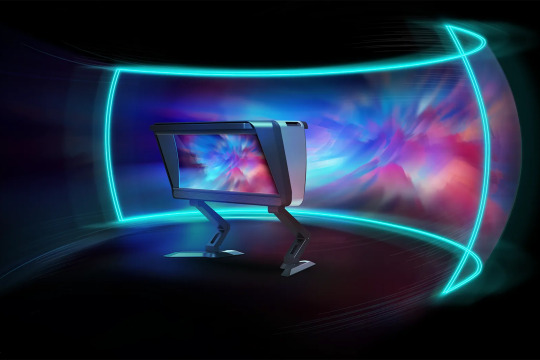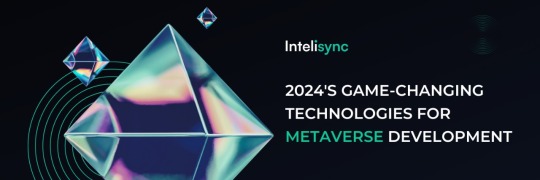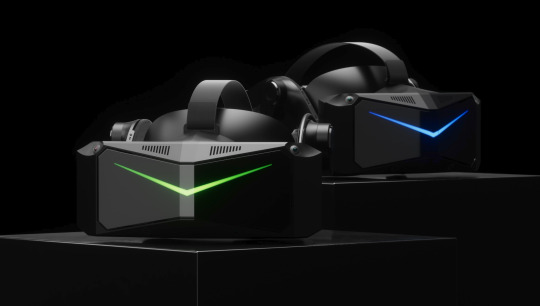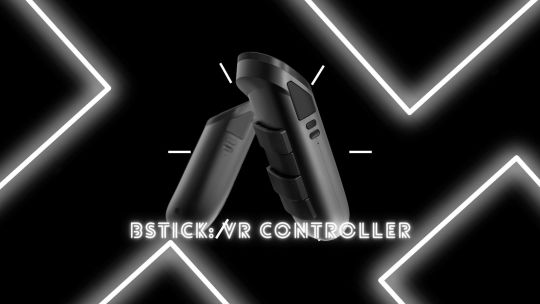#virtual reality devices
Explore tagged Tumblr posts
Link
Global virtual reality market is growing at a CAGR of 28.7% from 2022 to 2030.
0 notes
Text
Explore the world of Cyberpunk, a genre that pits man against machine in a dystopian future. From classic examples like Blade Runner to modern hits like Cyberpunk 2077, discover the key characteristics, aesthetics, and themes of this gritty sub-genre of science fiction. Dive into the impact and influence of Cyberpunk on literature, film, video games, and fashion, and share your thoughts on your favorite Cyberpunk books, movies, and games. Join the conversation and delve into the dark, neon-lit world of Cyberpunk.
#Cyberpunk#man versus machine#neo-noir#cybernetically enhanced future#punk genres#video games#dystopian#Blade Runner#technology#cybernetics#corporations#urban decay#hackers#virtual reality#megacorporations#rebellion#advanced technology#civil liberties#individual freedom#cybergoth#Neuromancer#Snow Crash#The Matrix#Deus Ex#System Shock#dark#humanity#intelligent devices#privacy#individuality
12 notes
·
View notes
Text
I had a dream that I got my Magic Leap headset and then took it to a forest to create magical crystals and rainbows in the streams there and then I took it to the beach to decorate the sand with glowing shells and stars!!!!!!! and then woke up to realize I’ll soon be able to do these things FOR REAL!!!!!!!
#incessant meowing#I'VE BEEN WAITING SO LONG TO GET A HEADSET THAT WORKS OUTSIDE#the possibilities are mind boggling#i won't actually be bringing it to the beach because yknow. sand.#BUT STILL.... i've got some fuckign PLANS#most of them revolving around celebrating earth day next month#i still can't believe i'm actually getting one of these headsets to work with#it doesn't use passthrough video like other headsets#it actually projects fucking holographic images onto your retinas#it has a depth sensor that can scan your surroundings to generate a 3d map#and this 3d map is used to project shadows of virtual objects onto your surroundings and also generates collision#the lenses have a dimming feature that you can use to turn down the brightness on all or parts of reality#for various purposes involving holograms...... which i will be making......#?!?!?!#like WHAT!!!!!!!!#i wonder if i'll ever be able to wrap my head around any of this#one day this tech will be as commonplace as all the other miraculous computing devices around us we all take for granted#but right now??? i'm living in a scifi novel and i'm losing my mind about it
13 notes
·
View notes
Text
Welcome to InnovateHub TechTalk: Unleashing the Tech Frontier
Greetings, fellow tech enthusiasts, and welcome to the inaugural edition of InnovateHub TechTalk! I am Lucas Redford, your guide on this thrilling expedition into the boundless realms of technology. With each keystroke and pixel, we'll embark on a journey to unravel the mysteries, embrace the innovations, and discuss the trends that shape our digital world.
Charting New Horizons:
In the age of rapid technological advancement, it's impossible to ignore the transformative impact that technology has on our lives. From the moment we wake up to the time we rest our heads, technology surrounds us, empowering, entertaining, and evolving at an unprecedented pace.
Our Quest:
At InnovateHub TechTalk, our mission is simple yet profound: to ignite your curiosity and keep you informed about the dynamic world of technology. Whether you're a seasoned coder, a budding entrepreneur, a digital artist, or just someone intrigued by the possibilities, this platform is your haven.
What Awaits You:
As we embark on this voyage together, here's a glimpse of what you can expect from InnovateHub TechTalk:
Innovative Spotlights: Venture into the heart of innovation as we showcase groundbreaking technologies and inventions that are reshaping industries and society.
Tech Chats with Experts: Join me in engaging conversations with thought leaders, industry experts, and visionaries who are shaping the course of technology.
CodeCraft Corner: Whether you're a coding novice or a seasoned pro, our CodeCraft Corner will be your source for coding tips, projects, and insights to elevate your programming prowess.
FutureTalk: Delve into the crystal ball as we discuss emerging trends, speculative tech, and the potential future landscapes that await us.
Be a Part of the Conversation:
InnovateHub TechTalk is not just a blog; it's a community. Your thoughts, questions, and insights are the catalysts that will drive our discussions forward. Don't hesitate to jump into the comment section, share your perspectives, and connect with fellow tech aficionados.
With great excitement, I invite you to journey with me through the digital maze, the electronic wonderland, and the data-driven universe that defines our age. Together, we'll decode complexities, celebrate achievements, and ponder the limitless possibilities that lie ahead.
As we dive into the sea of 1s and 0s, remember that innovation knows no bounds, and at InnovateHub TechTalk, we're poised to explore it all.
Welcome aboard, tech voyagers!
Lucas Redford
Founder and Chief Explorer, InnovateHub TechTalk
#Technology Trends#Innovation Insights#Tech Enthusiasts#Digital Exploration#Future of Tech#Coding Tips#Emerging Technologies#Tech Conversations#User Experience Design#Digital Transformation#Artificial Intelligence#Internet of Things#Cybersecurity#Software Development#Gadgets and Devices#Web Technology#Virtual Reality#Blockchain#Tech News Updates#Data Privacy#Cloud Computing#Tech Industry#Online Innovation#Science and Technology#Technology Community#Tech Insights#Cutting-Edge Tech#Digital Evolution#Innovation Spotlight#Technology Exploration
2 notes
·
View notes
Text

#IFTTT#Giphy#giphyupload#art#pixel#vintage#colors#pixel art#reality#computer#machine#colours#virtual reality#colourful#metaverse#simulation#device#8bits#module#gogolitus#reality simulator device#simmod#retrorealm
2 notes
·
View notes
Text
#AI in Smartphones#Android 16#Android Updates#Apple Updates#Augmented Reality#Cybersecurity#Device Security#facts#Firmware Rollouts#Foldable Phones#iOS 19#life#Mobile Technology#Podcast#serious#Smart Devices#Smartphones 2025#straight forward#Sustainable Technology#Tech Innovations#truth#upfront#Virtual Reality#website
0 notes
Text
In recent years, Virtual Reality (VR) and Augmented Reality (AR) have made significant strides in transforming industries, education, entertainment, and even healthcare. While both technologies are often grouped under the term extended reality (XR), they represent distinctly different experiences. This detailed comparison will explore both VR and AR in terms of their definitions, differences, applications, advantages, challenges, and potential future directions.
#Virtual Reality (VR)#Augmented Reality (AR)#Extended Reality (XR)#VR technology#AR applications#VR vs AR#Immersive experiences#AR devices#VR gaming#AR in retail#VR training simulations#AR navigation#VR headsets#AR education#Mixed Reality (MR)#VR healthcare applications#AR in marketing#AR glasses#VR development#Future of VR and AR
0 notes
Video
youtube
The world's first 3D replica of St. Peter's Basilica, made with Microsof...
1 note
·
View note
Text
Startup’s displays engineer light to create immersive experiences without the headsets
New Post has been published on https://thedigitalinsider.com/startups-displays-engineer-light-to-create-immersive-experiences-without-the-headsets/
Startup’s displays engineer light to create immersive experiences without the headsets


One of the biggest reasons virtual reality hasn’t taken off is the clunky headsets that users have to wear. But what if you could get the benefits of virtual reality without the headsets, using screens that computationally improve the images they display?
That’s the goal of the startup Brelyon, which is commercializing a new kind of display and content-rendering approach that immerses users in virtual worlds without requiring them to strap goggles onto their heads.
The displays run light through a processing layer before it reaches users’ eyes, recalculating the image to create ultrawide, visual experiences with depth. The company is also working on a new kind of content-rendering architecture to generate more visually efficient imagery. The result is a 120-inch screen that simulates the sensation of looking out a window into a virtual world, where content pops in and out of existence at different angles and depths, depending on what you feed the display.
“Our current displays use different properties of light, specifically the wavefront of the electric field,” says Brelyon co-founder and CEO Barmak Heshmat, a former postdoc in the Media Lab. “In our newest architecture, the display uses a stack of shader programming empowered with inference microservices to modify and generate content on the fly, amplifying your immersion with the screens.”
Customers are already using Brelyon’s current displays in flight simulators, gaming, defense, and teleoperations, and Heshmat says the company is actively scaling its manufacturing capacity to meet growing demand.
“Wherever you want to increase visual efficiency with screens, Brelyon can help,” Heshmat says. “Optically, these virtual displays allow us to craft a much larger, control-center-like experience without needing added space or wearing headsets, and at the compute level our rerendering architectures allow us to use every bit of that screen in most efficient way.”
Of light and math
Heshmat came to MIT in 2013 as a postdoc in the Media Lab’s Camera Culture group, which is directed by Associate Professor Ramesh Raskar. At the Media Lab, Heshmat worked on computational imaging, which he describes as “combining mathematics with the physics of light to do interesting things.”
With Raskar, Heshmat worked on a new approach to improving ultrafast cameras that used time as an extra dimension in optical design.
“The system essentially sent light through an array of mirrors to make the photons bounce many times inside the camera,” Heshmat explains. “It allowed us to capture the image at many different times.”
Heshmat worked across campus, ultimately publishing papers with five different professors, and says his experience at MIT helped change the way he perceived himself.
“There were many things that I took from MIT,” Heshmat says. “Beyond the technical expertise, I also got the confidence and belief that I could be a leader. That’s what’s different about MIT compared to other schools: It’s a very vibrant, intellectually-triggering environment where everyone’s very driven and everyone’s creating their own universe, in a sense.”
After graduating, Heshmat worked at a virtual reality company, where he noticed that people liked the idea of virtual reality but didn’t like wearing headsets. The observation led him to explore ways of achieving immersion without strapping a device to his head.
The idea brought him back to his research with Raskar at MIT.
“There’s this relationship between imaging and displays; they’re kind of like a dual of each other,” Heshmat explains. “What you can do with imaging, the inverse of it is doable with displays. Since I’d worked on this imaging system at MIT, what’s called time-folded imaging, I thought to try the inverse of that in the world of displays. That was how Brelyon started.”
Brelyon’s first check came from the MIT-affiliated E14 Fund after Heshmat built a prototype of the first device in his living room.
Brelyon’s displays control the angles and focus of light to simulate wide, deep views and give the impression of looking through a window. Brelyon currently sells two displays, Ultra Reality and Ultra Reality Mini. The Ultra Reality display offers a 10-foot-wide display and a depth of around 3 feet. The displays are fully compatible with standard laptops and computers, so users can connect their devices via an HDMI cable and run their favorite simulation or gaming software right away, which Heshmat notes is a key benefit over traditional, headset-based virtual reality displays that require companies to create custom software.
“This is a plug-and-play solution that is much smaller than setting up a projection screen, doesn’t require a dedicated room, doesn’t require a special environment, doesn’t need alignment of projectors or any of that,” Heshmat says.
Processing light
Heshmat says Brelyon has sold displays to some of the largest simulation training companies in the world.
“In simulation training, you usually care about large visualizations and large peripheral fields of view, or situational awareness,” Heshmat says. “That allows you to look around in, say, the cockpit of the airplane. Brelyon allows you to do that in the size of a single desktop monitor.”
Brelyon has been focused on selling its displays to other businesses to date, but Heshmat hopes to eventually sell to individuals and believes the company’s displays hold huge potential for anyone who wants to improve the experience of looking at a monitor.
“Imagine you’re sitting in the backseat of a car, and instead of looking at a 12-inch tablet, you have this 14-inch or 12-inch aperture, but this aperture is looking into a much larger image, so you have a window to an IMAX theater,” Heshmat says.
Ultimately, Heshmat believes Brelyon is opening up a new platform to change the way we perceive the digital world.
“We are adding a new layer of control between the world of computers and what your eyes see,” Heshmat explains. “We have this new proton-processing layer on top of displays, and we think we’re bridging the gap between the experience that you see and the world of computers. We’re trying to connect that programming all the way to the end processing of photons. There are some exciting opportunities that come from that. The displays of future won’t just let the light out just like an array of lamps. They’ll run light through these photon processors and allow you to do much more with light.”
#approach#architecture#Augmented and virtual reality#awareness#Cameras#Capture#CEO#change#cockpit#Companies#Computer science and technology#computers#content#craft#defense#Design#desktop#devices#display#displays#efficiency#electric field#Engineer#Environment#eyes#flight#focus#Future#gaming#gap
0 notes
Text
Augmented Reality in Construction |Benefits, Challenges, and Devices
Augmented reality (AR) enhances our real world by adding digital images, sounds, and text to our surroundings. Unlike virtual reality (VR), which immerses users in a purely digital environment. AR blends digital elements with the physical world, allowing interaction with both simultaneously. In this blog, we’ll explore what augmented reality means, a comparison of augmented reality vs virtual…
#AR#augmented reality for construction#augmented reality vs virtual reality#benefits of augmented reality#challenges of augmented reality#devices in augmented reality#Types of augmented reality#virtual reality
0 notes
Text
2024's Game-Changing Technologies for Metaverse Development

Picture a universe where virtual and physical worlds blend seamlessly, allowing you to interact with digital elements in real-time. As 2024 draws near, groundbreaking technologies are shaping this metaverse, making such interactions more immersive and dynamic than ever.
The metaverse, an expansive network of virtual environments, is evolving rapidly as we approach 2024, driven by several key technologies. Virtual Reality (VR) and Augmented Reality (AR) are at the forefront, enabling immersive experiences that blend the physical and digital worlds. VR technology has advanced significantly, offering users enhanced graphics, realistic simulations, and responsive feedback that create fully immersive digital environments.
AR enhances the physical world by overlaying digital information, enriching experiences in retail, healthcare, and entertainment through interactive and engaging environments.
Blockchain technology is essential for the metaverse, providing a secure and transparent method for managing digital assets and transactions. Non-fungible tokens (NFTs) allow users to own unique digital assets like virtual real estate and art, while smart contracts facilitate automated and secure transactions. The decentralized nature of blockchain promotes trust and reliability, making it a crucial component of the metaverse's infrastructure.
Artificial Intelligence (AI) further enhances user experiences by creating intelligent virtual agents, personalized interactions, and realistic simulations. AI-driven non-player characters (NPCs) provide engaging and adaptive experiences, and AI technologies enable natural language processing and speech recognition for seamless communication between users and virtual environments.
Edge computing and 5G technology are critical for the seamless operation of the metaverse. By bringing data processing closer to users, edge computing reduces latency and improves the responsiveness of virtual environments. 5G networks provide the high-speed internet required for real-time interactions, supporting scalable and complex virtual environments.
The Internet of Things (IoT) and spatial computing further enhance the metaverse by capturing physical movements and translating them into virtual actions, creating realistic and immersive experiences.
Elevate your business with Intelisync's cutting-edge metaverse solutions. Reach out to Intelisync today and learn how our advanced technologies in VR, AR, AI, and blockchain can revolutionize your operations, enhance customer engagement, and drive your Learn more...
#AI-driven NPCs#AR/VR for interactive product experiences#Artificial Intelligence (AI)#Augmented Reality (AR)#Blockchain#blockchain for secure transactions#Blockchain Technology#Edge Computing and 5G Technology#How Intelisync Uses this Technology for Growing Client Business#Increase in Engagement#Intelisync’s Metaverse Solution for Retail Business#Internet of Things (IoT) and Spatial Computing#IoT devices#Market Expansion#Metaverse Development#Metaverse development company#metaverse game development#Operational Efficiency#Personalization with AI#Sales Growth#Secure Transactions with Blockchain#smart contracts#social VR platforms and games.#Top 5 Technologies for Metaverse Development in 2024#Virtual Reality (VR)#Virtual Reality (VR) and Augmented Reality (AR)#Virtual Showroom#What is the Metaverse?
0 notes
Text
Pimax Crystal Super and Pimax Crystal Light: Two New High-End VR Headsets for Gaming

View On WordPress
0 notes
Text
The Convergence of Innovative Technologies: Projection Mapping, VR, and Self-Service Kiosks
Innovative Interactions through Projection Mapping Interactive
Interactive technology has seen remarkable growth, particularly with projection mapping interactive systems. This technology extends beyond traditional forecasts, creating captivating 3D displays on varied surfaces and revolutionizing advertising, events, and architectural displays. It's not just projection; it's an immersive experience that blends art and technology.
Self-Service Kiosks: Revolutionizing Customer Interactions
In the fast-paced digital age, self-service kiosks have become pivotal in enhancing customer experiences. Ranging from self kiosks to self ordering kiosks, these devices offer users autonomy and convenience, significantly improving service efficiency in various industries like retail, banking, and hospitality.
Virtual Reality: A Gateway to New Worlds
Virtual reality (VR) technology has transformed how we perceive digital spaces. Offering immersive experiences, VR transports users to different worlds, whether for gaming, education, or virtual tours. This technology is not just about entertainment; it's a tool for learning, exploration, and interactively understanding complex concepts.
The Synergy of Virtual Reality and Augmented Reality
The integration of virtual reality and augmented reality represents a significant stride in technological advancement. While VR immerses users in a wholly digital environment, AR enhances the real world with digital overlays, creating mixed-reality experiences. This synergy is particularly impactful in medical training, interior design, and education.
The Role of Virtual Reality Companies in Technological Advancement
Virtual reality companies are at the forefront of these technological advancements. They are developing immersive VR content and pushing the boundaries of what's possible in terms of user interaction and experience. These companies are instrumental in bringing VR into mainstream use.
Exploring Capabilities with Virtual Reality Devices
The capabilities of virtual reality devices have expanded significantly. Modern VR headsets offer high-resolution displays, realistic soundscapes, and intuitive controls, providing a deeply engaging experience. These devices are becoming more accessible and user-friendly, paving the way for broader adoption.
The Future of Interactive Technology: A Unified Digital Experience
Looking ahead, the convergence of projection mapping, VR, AR, and self-service kiosk technologies is set to create a unified digital experience. This integration promises to enhance how we interact with technology, offering more personalized, efficient, and immersive experiences. The potential applications of these technologies are vast and varied, indicating a future where digital interaction is seamlessly woven into the fabric of everyday life.
Conclusion: Embracing a Digitally Enhanced Future
As we embrace this digitally enhanced future, the possibilities are endless. From interactive displays that captivate and inform to VR experiences that transport us to other worlds, technology continues to break barriers. The ongoing evolution in projection mapping, VR, and self-service kiosks is not just changing the technology landscape; it's redefining how we connect with the world around us.
#projection mapping interactive#self kiosk#self ordering kiosk#self-service kiosks#technology vr#virtual reality#virtual reality and augmented reality#virtual reality companies#virtual reality device
0 notes
Text
The Convergence of Innovative Technologies: Projection Mapping, VR, and Self-Service Kiosks
Innovative Interactions through Projection Mapping Interactive
Interactive technology has seen remarkable growth, particularly with projection mapping interactive systems. This technology extends beyond traditional forecasts, creating captivating 3D displays on varied surfaces and revolutionizing advertising, events, and architectural displays. It's not just projection; it's an immersive experience that blends art and technology.
Self-Service Kiosks: Revolutionizing Customer Interactions
In the fast-paced digital age, self-service kiosks have become pivotal in enhancing customer experiences. Ranging from self kiosks to self ordering kiosks, these devices offer users autonomy and convenience, significantly improving service efficiency in various industries like retail, banking, and hospitality.
Virtual Reality: A Gateway to New Worlds
Virtual reality (VR) technology has transformed how we perceive digital spaces. Offering immersive experiences, VR transports users to different worlds, whether for gaming, education, or virtual tours. This technology is not just about entertainment; it's a tool for learning, exploration, and interactively understanding complex concepts.
The Synergy of Virtual Reality and Augmented Reality
The integration of virtual reality and augmented reality represents a significant stride in technological advancement. While VR immerses users in a wholly digital environment, AR enhances the real world with digital overlays, creating mixed-reality experiences. This synergy is particularly impactful in medical training, interior design, and education.
The Role of Virtual Reality Companies in Technological Advancement
Virtual reality companies are at the forefront of these technological advancements. They are developing immersive VR content and pushing the boundaries of what's possible in terms of user interaction and experience. These companies are instrumental in bringing VR into mainstream use.
Exploring Capabilities with Virtual Reality Devices
The capabilities of virtual reality devices have expanded significantly. Modern VR headsets offer high-resolution displays, realistic soundscapes, and intuitive controls, providing a deeply engaging experience. These devices are becoming more accessible and user-friendly, paving the way for broader adoption.
The Future of Interactive Technology: A Unified Digital Experience
Looking ahead, the convergence of projection mapping, VR, AR, and self-service kiosk technologies is set to create a unified digital experience. This integration promises to enhance how we interact with technology, offering more personalized, efficient, and immersive experiences. The potential applications of these technologies are vast and varied, indicating a future where digital interaction is seamlessly woven into the fabric of everyday life.
Conclusion: Embracing a Digitally Enhanced Future
As we embrace this digitally enhanced future, the possibilities are endless. From interactive displays that captivate and inform to VR experiences that transport us to other worlds, technology continues to break barriers. The ongoing evolution in projection mapping, VR, and self-service kiosks is not just changing the technology landscape; it's redefining how we connect with the world around us.
#projection mapping interactive#self kiosk#self ordering kiosk#self-service kiosks#technology vr#virtual reality#virtual reality and augmented reality#virtual reality companies#virtual reality device
0 notes
Text
Bstick:重塑虛擬現實互動,掌中的觸感革命
在科技飛速發展的今日,虛擬現實(VR)不再是遙不可及的夢想。隨著Bstick的誕生,我們進一步邁向了真實與虛擬無縫對接的新紀元。這款手持式虛擬現實力回饋控制器,以其獨特的設計和功能,重新定義了我們與數位世界的互動方式。 首先,Bstick的設計極為人性化。它摒棄了現有骨骼外骼手套式產品的不便,讓使用者無需忍受穿戴上的困擾。其簡潔的棒狀設計,不僅便於握持,更提供了傳統產品無法比擬的實在握感和震動體驗。這種設計,基於人體工學元素,將功能性放在首位,呈現出簡單而有效的外觀。 此外,Bstick的多功能性也是其一大亮點。無論是遊戲、醫療、虛擬訓練還是健身,這款產品都能派上用場。其六面不同類型的設計,讓任何人都能輕鬆上手,為各種內容提供更豐富的互動體驗。 更值得一提的是,Bstick在提供娛樂體驗的同時,也極大地促進了虛擬現實在醫療、復健、健康護理以及專業技能訓練等領域的應用。其直觀的棒狀模…

View On WordPress
#Advanced VR Tools#真實觸感體驗#Ergonomic VR Hardware#遊戲科技進步#醫療虛擬訓練#虛擬現實發展#虛擬現實控制器#虛擬實境#虛擬實境遊戲#虛擬實境資訊#虛擬實境新聞#高科技VR硬件#Fitness Virtual Reality#Gaming Tech Innovations#Handheld VR Device#Haptic Feedback Technology#Immersive Technology Solutions#Interactive Gaming Accessories#Interactive VR Systems#Next-Gen VR Devices#Realistic VR Experience#Virtual Reality Controller#Virtual Training Equipment#VR Application Development#VR in Healthcare#vr news#vr news today#VR遊戲配件#VR互動解決方案#健身虛擬實境
0 notes
Text
What is Virtual Reality (VR) and its Applications?
Today, Virtual Reality (VR) is a famous name in the Digital ERA world. You are sitting in a room and are marked as if you are present at the place where some events are happening. There is one such technique, which takes you closer to the world. Virtual Reality has become quite popular now. Everyone wants to use it, but fewer people have complete knowledge about this digital technology. In…

View On WordPress
0 notes